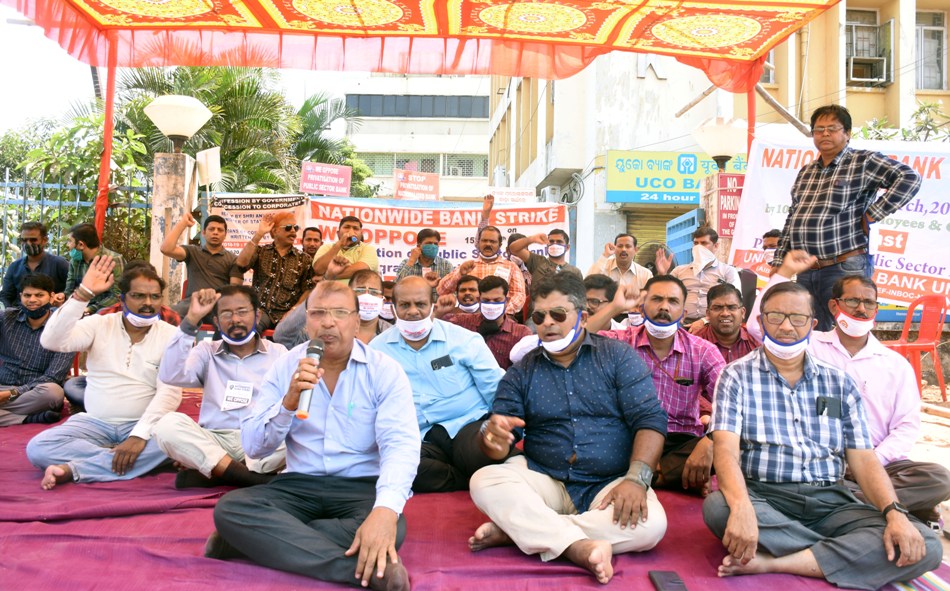The two-day national strike called by the United Forum of Bank Unions (UFBU), an umbrella body of nine bank unions, to register their protest against the Centre’s proposed privatisation and disinvestment plan, entered the second day on March 16 causing widespread hardships to customers across the country. The dislocation of services is severe as the nation’s 12 public sector banks employ 1.3 million-strong workforce with about 1 lakh branches spread over the country. The nationwide strike comes in the wake of the Union Finance Minister Nirmala Sitharaman’s announcement during the Budget presentation in February that the government would privatise two more public sector banks.
The decision is yet another evidence of the government’s bankruptcy of ideas to improve the country’s financial health. The disinvestment route to fix the economy has been repeatedly failing. Yet, the government is persisting with this policy. The grandiose plan to privatise government units with the ostensible goal of rejuvenating the economy has simply fallen flat. The government could not get the large sums it expected the disinvestment would bring in.
The bank unions fear the privatisation of banks, like the insurance sector, would not only lead to massive job losses, but would only help private players those that are close to the ruling party earn windfall profits. They are gearing up to launch an even greater movement on lines of the ongoing farmers’ agitation.
On the first day of the protest, thousands of bank employees took to the streets across several states. Nearly a million bank staff joined the protest as claimed by the unions. The managers participating in the strike head 80 to 90 per cent of the branches. This shows the scale of disruption affecting key services, including cash withdrawals, deposits, cheque clearances, and remittances across public sector banks. According to one report, 2.01 crore cheque instruments worth `16,500 crore could not be processed at the three national grids in Chennai, Mumbai and Delhi. Clearing of cheques could not be done as branches did not accept cheques.
The fear of the agitators that the government’s policies are going to worsen the economy further is not misplaced. The government’s intention seems to compromise the country’s financial security in order to placate private players who are keen on maximsing profits.
The striking unions got support from former Reserve Bank of India Governor Raghuram Rajan who remarked it would be a colossal mistake to sell the banks to industrial houses. The government has already privatised IDBI Bank by selling its majority stake in the lender to LIC in 2019 and has merged 14 public sector banks in the last four years.
As the government is handing over public sector banks to private players, the irony is it was able to implement its own schemes like zero-balance Jan Dhan accounts only on the back of the public sector banks, though it is doubtful in whose interests the accounts were opened. There were reports these accounts were used to turn black money into white during the ill-conceived demonetization.
Moreover, India was largely untouched by the 2008 global financial meltdown as it had strong public sector banks. These banks as well as public sector units are the only ones that give strength to public policy initiatives. For instance, the government has been insisting on digitisation of virtually every mode of financial transaction. With privatisation of banks, one can very easily foresee a situation where the private owners would prefer and will definitely try to shrink the number of branches, eliminating those in the rural belt that are not profitable as standalone units. This would lead to the creation of more compact and efficient operations for the new owners but would also entail banks moving away from a large section of the public. This is bound to happen sooner than later, no matter what counter arguments are put up at present. When cash has already been sucked away from the system and banks will not be physically available, the bulk of the country will be again pushed into the old Indian system of money lenders playing a crucial financial role. Lest some forget, it is this money lending activity that had created bonded labors. Apart from this, the disappearance of banks will lead to people depending more on chit funds and micro finance of which, barring a very few, most are rogues. This has been especially proven in Orissa and West Bengal.
While it is undoubtedly preferable if government gets itself out of commercial activities, it must also be kept in mind that the corporate sector of India has never demonstrated any innovation except trying to achieve super-normal profits for itself. Banking is a very core public utility service which can be equated with drinking water or electricity supply. It is required for survival of every individual. Handing such critical services over to untrustworthy companies with dark pasts can never be considered as a decision favorable to the national interest.
